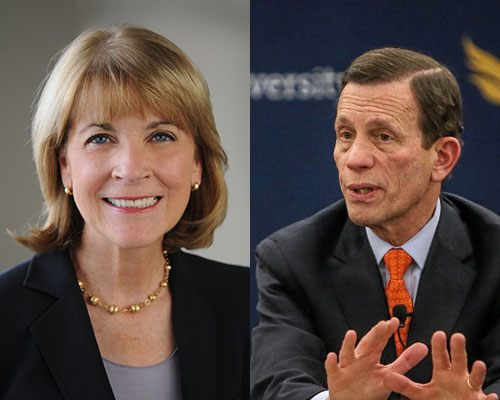Attorney General Martha Coakley holds a sizable lead over state Treasurer Steve Grossman in the race for governor, polls show. Grossman, however, is making a last minute pitch to residents of so-called “Gateway Cities” such as Haverhill and Methuen.
A WBUR poll released this week shows Coakley 24 points ahead of Grossman and 41 points ahead of Donald Berwick in Tuesday’s Democratic gubernatorial primary. Grossman has picked up political support from such Gateway City mayors as Daniel Rivera of Lawrence, Lisa Wong of Fitchburg and James J. Fiorentini of Haverhill.
“On Tuesday, I will be voting for Steve Grossman for Governor,” Fiorentini said on his Facebook page Thursday. Grossman has also received the endorsement of State Senator Kathleen O’Connor Ives, who represents two Gateway Cities.
The elected officials don’t appear to be concerned about any repercussions against them or their communities in the event of a Coakley victory.
Here is the text of Grossman’s plan for the state’s older, industrial cities.
Massachusetts has recovered from the recession ahead of the rest of the country. We created 14,000 jobs in the last month alone and 67,000 jobs in the last 12 months. But statistics, trends, and rhetoric do little to comfort Massachusetts families dealing with the reality of a tough economy—older workers out of work for months and sometimes years, young people who want to earn a living wage but can’t afford the rising price tag of college, or small business owners ready to hire but unable to find workers who have the skills they need for today’s innovation economy.
Our Gateway Cities face significant challenges, but I see a tremendous opportunity for sound economic policy and common-sense investments to build on their assets – a deep history of culture and the arts, lower housing costs, growing manufacturing companies starting to reap the benefits of on-shoring, and close proximity to the state’s 29 public colleges and universities. My economic agenda includes three central ingredients to revitalize widespread economic growth across the state that will have a particular impact on Gateway Cities.
Encourage Business Growth. We must remove the roadblocks and barriers to encourage business growth in our Gateway Cities. In Lowell, I visited the Merrimack Valley Sandbox and heard repeatedly about the need to alleviate burdensome start-up costs for entrepreneurs by exploring the potential to lower LLC fee and minimum corporate tax payments in the state. In Fall River, the Advanced Technology and Manufacturing Center (ATMC), overseen by UMass Dartmouth, is helping to generate emerging growth companies that will contribute to resurgent manufacturing on the South Coast and in Bristol County. In addition, lengthy waiting periods for permitting and overly burdensome regulations put Massachusetts at a disadvantage with other states like North Carolina competing for the manufacturing and biotechnology jobs of the 21st century. State agencies like MassDevelopment have moved nimbly and creatively with significant results such as Bristol-Myers Squibb’s massive investment and job creation at Devens and the arrival of Menck Windows in Chicopee with new jobs for a city that has not seen a lot of new manufacturing jobs in decades.
Train Workers to Close the Skills Gap. Massachusetts employers have 100,000 unfilled job openings because unemployed workers lack the required skills. Now is the time to invest in skills and industry-specific training. Many of these jobs are located within a Gateway Cities economic watershed. Enhancing the quality of education for the 44,000 students now attending vocational-technical schools and programs, is crucial to ensuring that Massachusetts can close the skills gap in the decades ahead. And given the long waiting lists for these programs, investing in the expansion of vocational-technical schools could not be a more important priority. At Westfield State University, I met with more than a dozen young men and women determined to land a job after graduation but struggling to keep up with the rising cost of college. That’s why I want to freeze tuition and fees at our public colleges and universities for the next four years and create 5,000 paid summer internships for our college students, so that young people can experiment with career choices and network with employers while earning their education.
Invest in our Infrastructure. Attracting businesses and training workers only helps the economy grow if those workers can find affordable housing and transportation to get to work. Gateway City transportation and housing resources need additional public investment. I will facilitate public-private partnerships that enable developers to acquire or lease public land virtually for free, provided they guarantee to build housing with predictable rents within reach for low and middle-income families. We must also fully implement Governor Patrick’s transportation plan, “The Way Forward,” which encompasses priorities such as ensuring that our regional transit authorities (RTAs) are financially secure, careful attention to deferred maintenance, South Coast Rail, and enhanced rail service to Cape Cod and Western Massachusetts. Again and again, young professionals tell me that if we can solve the housing and transportation crises, they will live, work, play, and stay in Massachusetts.
A Grossman administration will be a gateway to the future. The resurgent economic health and well-being of our Gateway Cities is essential to that vision. Let’s build One Commonwealth that levels the playing field and leaves no one behind.

